Business gets started early at Smiley’s Flea Market, located on Hendersonville Road, a few miles from the airport — oftentimes, before the crack of dawn.
Vendors refer to the early risers as “flashlight vampires” — people who arrive in the pre-dawn twilight, headlamps strapped to their heads, some still in robes, searching for items they can buy at a good discount, sometimes to re-sell at their own flea market booths.
These nocturnal bargain-hunters are just one of many colorful kinds of folks who can be found at local flea markets scattered across Western North Carolina, where tens of thousands of residents make the weekly pilgrimage in search of great deals, rare goods and a fun time.
While some folks see flea markets simply as a way to find “cheap stuff,” others celebrate the markets’ sense of community and locally focused entrepreneurial spirit, finding in them a form of commerce supportive of their neighbors.
Value village
“There’s a lot of history and community involved with the flea market business,” says Ben Campen Jr., president of both the Smiley’s Flea Market company and the National Flea Market Association. “It’s really fun to watch the interaction between people and the energy that comes with every weekend.”
Strolling through Smiley’s outdoor “yard sale” area, one quickly realizes the market is about more than sales. The smells of Mexican cuisine waft through the open air while different languages and accents bounce back and forth among the crowds. In one corner of the yard, a carousel circles slowly, carrying a dozen or so children, as parents take a brief respite among the shaded tables surrounding it.
You might also find Campen’s father, Ben Campen Sr., the co-founder of Smiley’s, making the rounds, checking on customers and vendors, picking up trash and ensuring that all runs smoothly. The elder Campen opened Smiley’s Fletcher location — the company also owns a market in Macon, Ga., and an antiques mall in Gainesville, Fla. — in 1984 because, he says, he “loved the mountains and wanted to create something permanent that would be of service to the community.”
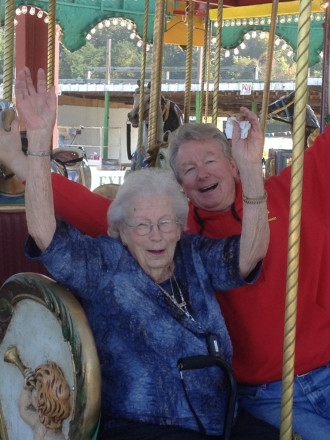
Since those early days, Smiley’s Flea Market has grown into its own subculture. “It’s turned into its own little village,” Campen Sr. says. “We have a meat market, a bakery, car tinting and auto services, and a huge yard sale with about 700 spaces outside.”
Richard Pope, a retired Air Force veteran, sits grinning behind a table of assorted books and collectibles he’s scoured from other markets, thrift stores and yard sales. “It’s a good way to make a little extra dough,” he says of the market. “Plus, I like dealing with people.”
As the afternoon sun hangs high above the outdoor portion of the market, the crowds thin out and vendors load the backs of trucks and cars. A few sellers and buyers walk the yard, searching trash cans and now-vacant vendor tables for abandoned gems.
“Everything that can, gets reused,” laughs one vendor as he packs things into his trunk. “You sell something, and you’re liable to see it on someone else’s table next week.”
Start small, think big
Flea markets might be a great way for folks to get rid of unwanted household items and make a few extra bucks, but with rental rates for retail businesses around Asheville on the rise [See “Land of Sky High Rents,” Aug. 19, 2016, Xpress], they also offer a low-cost way for entrepreneurs to start a business and create a new income stream.
“We’re kind of an incubator for small business,” Campen Jr. says. “[Vendors] can come out and start to hone their craft before they go out and get into something where there’s a lot more overhead.”
Campen Sr. says he’s noticed a more diverse range of sellers hoping to establish professional businesses since Smiley’s early days, especially since the Great Recession and its ensuing slow economic recovery.
“For a lot of people, it’s their full-time job,” he notes. “During the week, they’re acquiring new inventory, [or] they’re going out to other flea markets or estate sales or auctions. I’ve seen it grow to that sophistication of a more professional business, where people understand they can really make a good living.”
“The most interesting aspect about any of the models [of] flea market is that they create local micro-economies,” says Susanne Watson, co-owner of The Downtown Market, or the DTM, located at 45 South French Broad Ave., on the edge of downtown Asheville. “The influx of these types of markets has arisen due to our economic climate and created a huge new class of businesses that cannot afford to have a shop of their own.”
Making ends meet
Other vendors, Watson notes, use venues such as the DTM as one of several sources of income they need to afford the higher cost of living in the region. Rental housing rates in Asheville climbed 7.6 percent in the past year alone, reaching a median of $1,180 a month, according to an April 12, 2016 Citizen-Times article, and the lack of available housing has driven home prices to a premium recently.
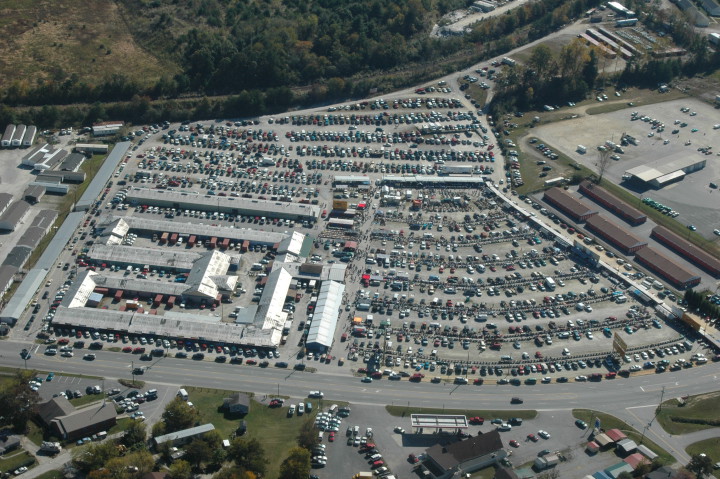
“It used to be that doing this type of selling was for the veteran picker, antique dealer, festival vendor, fine crafter or the weekend hobbyist,” she says. “Now, many people find that it’s one of the ways to generate income in a town with very few job options, let alone career opportunities.”
Susannah and Bob Powell, the owners of Rocks Are Here rock shop at Smiley’s, are an example of vendors whose business grew from a way to get by to a way of life. The Powells say they started out selling general home maintenance and construction equipment several years ago, after Bob was unable to keep his job as a contractor due to health concerns.
But after “rescuing” a large private mineral collection at a storage sale a few years ago, they decided to open the rock shop, which has expanded into several adjacent stalls and also offers fossils, decorative skulls and a whole section of mining equipment.
“Even though we’re only out here three days a week, it’s really a four-day job,” Susannah notes, adding that her shop’s visitors range from local school groups on field trips to customers wanting jewelry crafted from a meaningful stone.
Service with a smile
In a community-minded region like Western North Carolina, flea markets can be a good place to connect with a variety of sellers and customers in ways that go beyond mere monetary transactions.
At the Jupiter Tailgate Market, just off Exit 15 on future Interstate 26, sellers range from elderly farmers and scrap-metal collectors to young families selling T-shirts and pre-packaged socks. Subarus are parked next to pickup trucks, their passengers wending their way among the vehicles in route to and from the tables.
It’s a smaller crowd than usual for a Saturday on the day of our visit, because of the heat, says a bubbly furniture and decorations vendor named Kaye, who pauses periodically to chat with browsers about family, church and weddings. “That’s my main objective,” she says, “making people feel good and welcome to be here.”
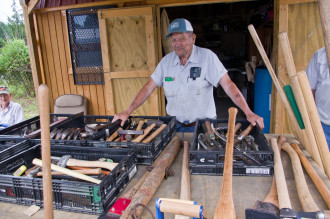
One of Kaye’s customers nods her head enthusiastically in agreement. “There’s a big community aspect here,” the woman says. “I’ve been coming here five years, and these are the friendliest people I know.”
The origins of the Jupiter market itself speak to a community coming together, according to a longtime vendor named Donald. “We used to sell out by the side of the road,” he notes. “But the folks in Barnardsville and the state didn’t like that.” In response, the owners of Jupiter Enterprises, a local trucking company, opened the front of their property for the sellers to congregate on weekends.
Customer service is a big part of any business’s success, but at the flea market, it’s absolutely crucial. The personal relationships you develop with customers at the market, says Powell, is something not often found at regular retail stores.
“I think any psychology major in college should have to intern at a flea market for a month, because you get exposure to so many different people and personalities,” she laughs. “Customers don’t just buy something at the counter and go away: People start talking and it turns into a conversation — you can get an insight you wouldn’t normally get [elsewhere].”
One recent visitor, she says, was a woman seeking out a special stone to help give her strength after a cancer diagnosis. Another was a badly burned boy, who had decided to begin a rock collection while he recovered from his injuries. “Those interactions mean the most,” she notes. “If you approach someone with a friendly attitude and just ask them about themselves — that person becomes more than just a customer.”
Other markets, like the DTM, try to facilitate an atmosphere that goes beyond shopping and creates a community space for customers and sellers alike. The Sly Grog Lounge, attached to the DTM and also owned by Watson and Lance Hardcastle, features live music, events and drink specials throughout the week.
“Shopping can be both fun and stressful, so our bar is filled with board games, vintage video games and books, with a relaxed environment,” Watson says. “Our overall sense is that life should be fun and that most of us are looking for social interaction and experiences that reflect where we live and how we want to be in our environment.”
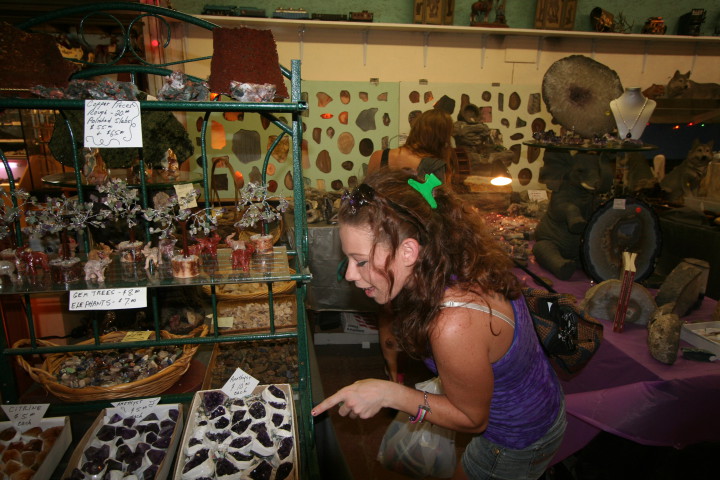
Rare finds
The term “flea market” is often as broad in meaning as the variety of goods one finds perusing them. While generally considered to be an outdoor market specializing in secondhand goods, it can also be a treasure trove for rare, unusual or specially crafted items.
“Lots of people come out for our produce, and we’ve been recognized as having some of the best Mexican food in Western North Carolina,” says Campen Sr. “You never know what you’ll find here.”
As an example, he notes local lawyer Frank Abrams’ 2012 purchase of an old tintype photograph from a Smiley’s vendor for $10. Over time, Abrams began to suspect the photo’s subjects to be none other than the legendary outlaw Billy the Kid and his former friend and eventual murderer Pat Garrett. While researchers are still analyzing the photograph to determine its authenticity, it may be worth millions of dollars, according to a Jan. 11, 2016 article in the Asheville Citizen-Times.
At the DTM, Watson and Hardcastle select vendors that reflect the market’s mission, with a focus on vintage items, antiques, upcycled products and crafts.
“The Downtown Market was one of the first in the area to try to curate consciously a mixture of vendors, so that customers could find a wide variety of needed, useful and beautiful cool things all in one shop,” explains Watson. “We have thought of ourselves as an ‘anti-mall,’ a collective and a community. Our type of market reflects the local scene and flavor of Asheville — higher-end markets both in town and in larger cities shop with us, as well as locals and tourists looking for interesting things at reasonable prices.”
Sometimes, the unusual finds extend past what’s being bought and sold. Longtime residents will remember the former Dreamland Drive-In on South Tunnel Road, which doubled as a flea market during the day. By 1990, the Pless family, which owned Dreamland, had dropped the drive-in theater portion of the business and focused on the flea market full-time, according to a 1995 oral history interview with Paul Pless and Kathy Bowman, who lent a hand with the market’s day-to-day operations.
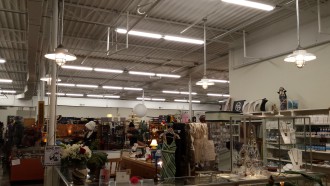
In the interview, Pless recalls colorful run-ins with vendors, including a local Baptist sect that held a funeral service there after-hours, and the time he found a real-life lion tied beneath a bus.
Current City Councilman and former Xpress staff writer Cecil Bothwell described Dreamland in 1995 in Mountain Xpress’ “Best of WNC” coverage as “one of Asheville’s favorite places to shop[.] Ashevillites drive there in droves, rave when they arrive, and find that, yes, they can take it with them when they go.”
Digital deals
As with most things in the modern world, the rise of the internet has had its impact on local flea markets. While most people are familiar with private-seller digital supermarkets like eBay and Craigslist, social media has also facilitated online flea market communities across the region. Facebook groups like the “West Asheville Exchange” and “Buncombe County Buy, Swap, Sell, Give Away” have attracted large followings and developed close-knit communities all their own.
Amanda McDevitt, who took over the Buncombe Swap group in 2014, says that membership has ballooned from 5,000 people to 34,000 in her time as administrator. “As far as I know, mine is the largest buy/sell group in Buncombe County,” she writes in an email. “Something must be working for the group to have grown so rapidly.”
The convenience of being able to sell and shop online, she notes, is the primary reason why people gravitate to these online forums: “Instant gratification plays a big part, [plus there’s] no waiting for or having to deal with shipping.” Sellers advertise their goods on the page, according to a specific group’s guidelines, and potential buyers contact them to offer a bid. If accepted, the transaction is usually conducted in person, to prevent fraud or shifty deals.
While the internet may be the hot new option for local sellers and buyers, Campen Sr. believes that traditional flea markets still offer many things their online counterparts can’t. “Smiley’s offers people the chance to get out and exercise, get some vitamin D, meet and negotiate,” he says. “You get to touch and feel the products, and it’s exciting.”
“Consumerism has become a way of life in our country and it can be very isolating, especially with the rise of online shopping and crowded malls and box stores,” agrees Watson. “Many of our vendors also use eBay and Etsy. However, our store is a great testing ground for these people, to see if their product or ability to procure things will work for them.”
A hard bargain
Despite the freewheeling atmosphere, low-overhead costs and creative license that flea markets offer, they’re not always immune to the harsh realities of commerce.
At the Jupiter market, one elderly produce vendor bickers with a woman and her husband over the quality of the cantaloupes spilling from the back of the vendor’s truck. “You have to deal with people trying to find flaws with everything,” the old farmer mutters as the couple ambles off. “That way they find an excuse not to pay what [an item’s] worth.”
A vendor must also be careful about where and from whom he buys his goods, says Donald. “You can’t buy from just anyone,” he cautions. “Things may be stolen or who knows what.” That unfortunate reality of flea market culture has its effects on how it is perceived, according to Powell. “It’s scary to some people, because they think it’s just full of — I don’t know,” she muses. “They have this perception that it’s too lowly for them to shop there, even though there might be a lamp down the way that would be $200 in a store on sale for $45.”
Nor are the markets themselves immune from changing economic and development trends. The Dreamland Flea Market, despite its popularity, eventually was consumed amid a wave of development around East Asheville in the mid-1990s. By 1997, as a sign of the changing times, big-box retailer Lowe’s Home Improvement had received approval from City Council to build a store on the property.
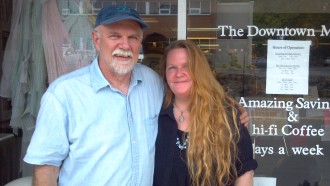
This August, Watson and Hardcastle announced that The Downtown Market would be closing at the end of September, due to an inability to find an affordable new space coupled with declining sales. The Sly Grog Lounge will move to a new location and remain a stand-alone business.
“Finding a [new] space that has the right traffic for our business, parking, affordable rates and doesn’t require a huge amount of up-fit has proven to be challenging,” Watson and Hardcastle wrote in their official closure announcement. “After a lot of soul searching, we feel that we need a break.”
Despite DTM’s troubles, Watson feels that the market served an important role for both its vendors and customers in its time. “Our story is one that reflects our local, national and even global economy,” she writes. “We feel that with all of our loyal customers and vendors we have created a community, a loving and supportive family, and a small but meaningful economic impact.”
Dealing in the future
With technology changing the nature of private sales and no guarantee of success, many flea market owners, sellers and buyers prefer to focus on the things they can control. While Campen Jr. says that Smiley’s is always open to considering new locations, his focus for the moment is on making their existing locations in Fletcher and Macon, Ga., the best they can be.
“We’re concentrating on those and making sure we’re taking care of our vendors and customers,” he says. “If we could open another location or two, that [would] be great, but you just kind of have to see how things are. I don’t want to get spread too thin.”
Powell hopes that more people will change their attitudes about flea markets and give Smiley’s a try. “I’d like to see more people come out that perhaps think it’s not for them,” she says. “There’s all kinds of people that come here, from all walks of life. It can be a very fun and intimate experience, [more] than just going downtown.”
As for Donald, he sees the Jupiter Tailgate Market continuing to grow in the coming years, as new development springs up in and around the Weaverville area. Regardless of what the future holds, he says he’ll be out there on the weekends, rain or shine, come what may. “I’ve been doing it all my life,” he says. “Once it gets in your blood, it’s there.”



“Flashlight vampires”- I had to laugh.
Records, tools, books and camping stuff for me, but I get there later when the sun has been up for a while.
Nice article.
“Flashlight vampires” was too good a term not to include. Thanks for reading!